2011 Earthquake & Tsunami
Special Report
CONTENTS
A Year Since the Disaster: The View of Students
One year has passed since the unprecented earthquake and tsunami struck Tohoku and Kanto region, and Fukushima Daiichi nuclear disaster hit Japan on March 11, 2011. Many people were displaced from their homes and have been forced to live as evacuees. A large number of people are suffering from the lost of their relatives or lost of financial support.
We received letters from students from the disaster-hit region and published them for the first time here. Although one year has passed, the wounds are not yet healed and people have to fight their anxiety of not being able see their future and bear the loneliness of not being able to go back home.
Please listen to the voices of students who are struggling to face up the reality and moving into positive direction thinking how their experiences might be useful in the future.
The Toll
| Dead | Missing | |
|---|---|---|
| Total | 15,845 | 3,339 |
| Prefectures | ||
| Hokkaido | 1 | |
| Aomori | 3 | 1 |
| Iwate | 4,667 | 1,325 |
| Miyagi | 9,507 | 1,797 |
| Akita | ||
| Yamagata | 2 | |
| Fukushima | 1,605 | 216 |
| Ibaraki | 24 | 1 |
| Tochigi | 4 | |
| Gunma | 1 | |
| Saitama | ||
| Chiba | 20 | 2 |
| Tokyo | 7 | |
| Kanagawa | 4 | |
| Niigata | ||
(As of Feb. 1, 2012, National Police Agency)
Reconstruction Assistance by University Co-ops
| Condolence money | Students who lost their parents | 138 people |
|---|---|---|
| Students whose house is completely destroyed | 1608 people | |
| Students affected by nuclear accident | 418 people |
(as of February 10, 2012)
| Fund-raising for study continuation | 62,961,895 yen | |
|---|---|---|
| Fund-raising for students affected by nuclear accident | 1,080,643 yen | |
(as of February 10, 2012)
| Students participating as volunteers (19 terms) | 614 people |
|---|
(as of February 20, 2012)
| Number of telephone consultations for students afflicted by disaster | 259 people | |
|---|---|---|
(Apr 11-Sep 30, 2011)
Students report
CONTENTS
"I want to be a better person in spite of my limited time at the university"
Endo
Third Year Student, Department of Literature, Morioka University
I live in Onagawa, Miyagi. Almost all parts of Onagawa were washed away by tsunami that occurred on March 11, 2011. A week after tsunami hit Tohoku region, I went home and found no “trace” at all, literally. I couldn’t feel anything upon seeing a place that was used to be filled with houses. I didn’t feel any sorrow, I just remember a stunned feeling that everything has gone. A year has passed since and now I live a life with that stunned feeling remains.
Traces left in coastal areas
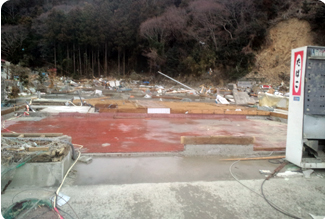
Mr.Endo lived here before the disaster.
Living in inland will sometimes make you feel that earthquake and tsunami did not occur from the first. If compared with coastal areas, there were almost no traces of earthquake and tsunami in the city. Sometimes I feel like I came to a totally different world. The feeling of a huge gap comes when you look at traces of tsunami events in coastal areas. Reconstruction efforts also vary—some areas do not proceed with reconstruction efforts at all. A lot of places suffer land sinkage, seawater reached to places unprecedented, trains stopped operating due to railways damage and buses are now running instead. Temporary housing units were built everywhere and people live there while facing tough conditions.
Naturally, my life has changed completely. My family’s workplace was swept away so my parents have lost their job. Now I pay the college tuition with scholarship fund. As I am enrolled in a private university, of course the tuition is not cheap. If I can’t manage to save a part of the living cost, I might not be able to pay the tuition. Even though I receive deduction of tuition, I still have to buy a lot of things. I can’t say that I have the luxury just because I got part tuition exemption. My family now lives in Onagawa, inside a temporary housing complex and live a very modest, if not poor, life.
Studying in A Limited Time
There is a tiny feeling of wanting to graduate soon and work, but more than that, I want to study as much as I can in such a limited time until my graduation. My parents have lost their workplace and naturally I want to support my family by getting a job. But I also want to support my family properly by studying a lot of things and preparing myself to become a better person than ever.
I still have one year before graduation. I was reminded by the earthquake and tsunami of how one year can be so short or long at the same time. I would like to spend that one year by thinking how I can grow to be a better person and learn a lot of things in such long but short time, and trying hard to realize those thoughts.
On the fateful day, Endo (a member of Student Committee of Morioka Univ Co-op) was in the store, acting as the leader of housing mediation service for new students. He could not get in touch with his family until a week later. His family was safely evacuated. I could not imagine if Endo was not in his house that day. Even now, Endo still actively participates in Student Committee and gives various advice to his junior for the housing mediation service being conducted in this time (February).
Yasunobu Murai, Managing Director of Morioka University Co-operative
A Year After the Fateful Day
Miki Takahashi
First Year Student, Faculty of Education, Iwate University
March 11, 2012 will mark the one-year anniversary of the horrific earthquake and tsunami that struck northeastern Japan. I did not expect at all to be involved in such a great disaster.
Memories of what happened then
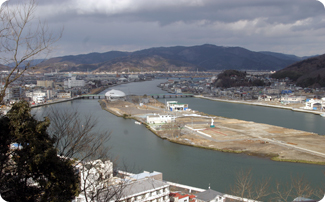
Ishinomaki city (January 27 2011)
On the fateful day, I was at home with my younger brother in Ishinomaki, Miyagi Prefecture. I was planning to go to Iwate in the evening with my mother to sit for the university entrance examination for fall admission. I was having a late lunch with my brother when the earthquake shook. Since earthquake happens frequently, I thought that this was just another quake. However, the tremor was getting stronger so we crouched under the kotatsu table and waited until the shaking stopped.
When the shaking stopped, we heard a loud siren. It warned, “Attention, an enormous tsunami warning has been issued for the coastal area!” So far, tsunami warnings have been issued when earthquake happened, but tsunami never hit. The place where I live is considerably far from the sea so I always thought that tsunami would not reach our place. However, I never heard a warning that says “an enormous tsunami” before, so we evacuated to a home-center store’s roof with our neighbours. Shortly after the evacuation, tsunami struck and eroded the area.
Saying goodbye to anxiety
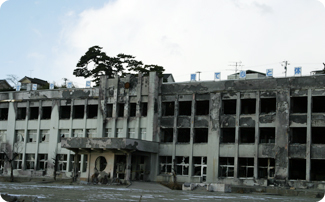
Ishinomaki Kadonowaki Elementary School (January 27 2011)
We spent 4 days on the roof of the home-center store. On April 16th, we went back to our house in knee-deep water and finally were reunited with our mother on April 17th. Since then we live at the evacuation center which is slightly far from our house. We were able to get relaxed there, but at the same time I began to feel anxious. What about my mother’s job? Can I go to the university? How about the entrance exam? What if I fail the exam?
The postal service was halted and I could not use my mobile phone, so I have no means of communication. I felt anxious at not knowing anything. I even thought to let go my dream of going to university.
However, under the encouragement of my mother and relatives, I received generous assistance ranging from information about the university and moving to Iwate. I was able to enter the university without any difficulty. I really feel the importance of family, relatives and neighbours and feel grateful for that.
Considering the circumstances then, I’m thankful that I can attend a university now. I really appreciate my family and all people who have helped me realize my dream.
Smiles from Fukushima
Rumi Imamura
Second Year Master Student, Division of Letters Graduate School, Tohoku Gakuin University
My life changed 180 degrees after the devastating earthquake and tsunami on March 11, which knocked out power to the Fukushima Daiichi nuclear power plant.
A Home that I Can Never Go Back To Ever Again
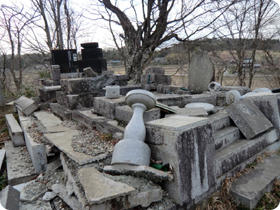
A grave after the earthquake (at Ms.Imamura's parents' home)
My parents’s house is located within a 5 km straight-line distance from Fukushima Daiichi nuclear power plant. Because the house is far from the sea, there was no damage of tsunami. But the earthquake caused serious damage to our house and cracked the ground—circumstances that I have never experienced before.
Moreover, the power plant nuclear accident forced us to leave our home. I thought having a home was in the natural order of things. A home is a comforting and heart-warming place for someone to go back to, so the thought of losing a home never crossed my mind.
Since March 12, my family and I have moved 5 times from one evacuation center to another. In some places, people gently welcomed us, which enabled me to spend time and establish a feeling bond between people. However, being in a new environment also added pressures on me. I felt a bit confusion about my next step. Should I continue my graduate degree? Can I advance my own research under the circumstances? Should I find a job instead for the sake of my family? I have to struggle with my own mind. I feel insecure and have conflicted feelings.
But local people have been undertaking reconstruction efforts in the form of festivals and folk performing art, in fear of losing our history and culture. I was feeling inspired when I saw this. I can feel the love for our hometown by men and women of all ages. I won’t lose to the disaster.
Becoming a teacher
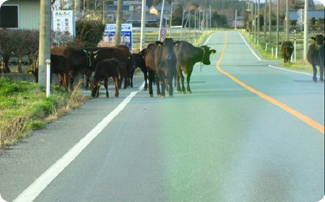
A month later,the state of the nuclear accident
I still continue to live as an evacuee, apart from my family because of our circumstances (I have to go to the university, my parents to their workplace). Compared with the past, I am no longer facing problems with food, clothing and housing. But even after a year since the fateful day, people of Fukushima cannot go back to their homes or carry out reconstruction efforts. Although I don’t know how long I will have to continue living in evacuation center, what is important is to achieve my goals one by one.
Having experienced the great earthquake and tsunami, I came to think that I want to be a teacher. I have always wanted to become a teacher, but what I have gone through and learned in one year made me wanted to pass them to the future generation. I will work hard to do whatever I can to bring back the smiles of people in Fukushima.
Finally, I want to thank everybody for their support. While realizing that we are still in need of time and financial resources for reconstruction efforts, let’s move forward one step at a time. Gambappe,Tohoku!
My Life as a Person Affected by Fukushima Daiichi Nuclear Disaster
Keiko Takahashi
First Year Student, Faculty of Administration and Social Sciences, Fukushima University
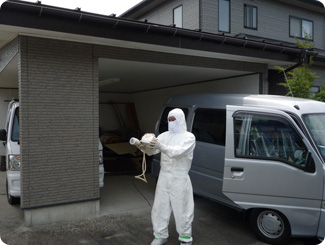
Keiko’s father measures the radiation dose around the house with a Geiger counter
I am one of the those who are affected by Fukushima Daiichi nuclear disaster. Our house was located about 5 km from the nuclear power plant. When you enter that area, you must wear a white hazmat suit to prevent radioactive materials from entering the body. The amount of radiation inside the house in November was 4-7 microSieverts/hour. Normally, the amount of radiation when nothing happens is 0.05 microSieverts/hour, so the figure was 100 times above normal. I think I cannot go back there for the rest of my life. Even if I can go back, I won’t. I have a fear that I might be exposed to health problems, such as cancer or leukimia, just like Chernobyl.
Losing home
When the quake happened, I felt very strong tremors that I thought our house would collapse. At that time, I did not feel worried about the nuclear power plant. Or rather, it was such a big earthquake that I had no time to think.
The evacuation order was issued in the morning of March 12. I didn’t have the time to clean up the house. Most people carried things in their luggage enough for 3-5 days only. A lot of people thought they could return in one week. Around 1:00 PM, we saw the explosion in the building housing reactor 1 at Fukushima Daiichi nuclear power plant from the television coverage in a relative’s house, 15 km away from the plant. That was when I thought everything was over and I could not come back anymore.
After two times moving to different shelters, I went to a relative’s house in Yamanashi Prefecture to escape from radiation. Throughout the journey, I was desperate to escape from blind terror. For a month after arriving in Yamanashi, I did not watch TV at all. I wanted to avoid anything related with the nuclear power plant accident. I just could not believe that it really happened. I became easily irritated and began talking in my sleep, probably because of shock.
Things I feel and think are very complicated and I could not give straight answers for issues related to my life. Our town mayor said that we should draw up and go ahead with decontamination plans, and go back to the town. If it’s possible, I’d like to do it. After all, it’s our hometown so we all want to return.
However, decontamination cannot guarantee 100% removal of radiation. Although the government announced that the Fukushima Daichi nuclear power plant has officially reach a state of “cold shutdown,” the plant is still in a dangerous state. If another big earthquake happens, it might explode and the damage might escalate to something very serious. How could the government stated that cold shutdown is achieved?
There are a lot of people who suffer mentally and economically. Some of my friends had stopped going to the university because of economic difficulties. The disaster still continues. Fukushima is still far from recovery, let alone reconstruction. Please do not forget that.
I beg you to come and continue helping the disaster areas. Loneliness and isolation in temporary housing are great challenges in the future. To prevent those from happening, we need help from volunteers to connect the local people. People who lived in areas around the crippled Fukushima Daiichi nuclear power plant came under a lot of pressure. But I don’t want to give up. I’d like to tell the world about our situation and feelings.